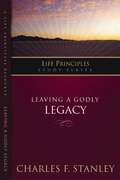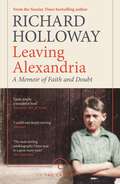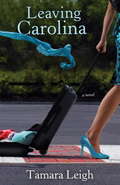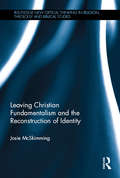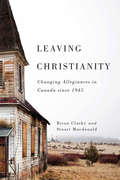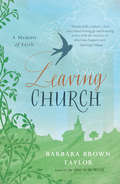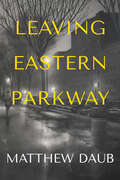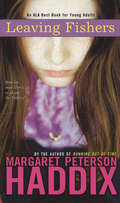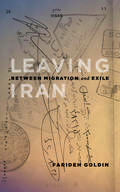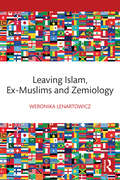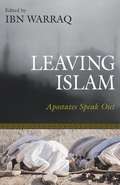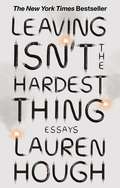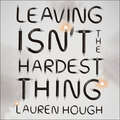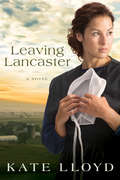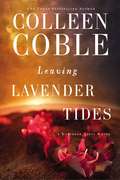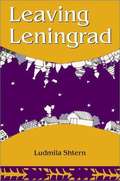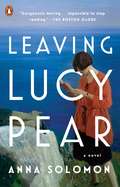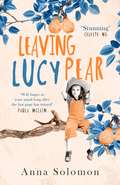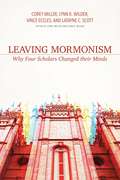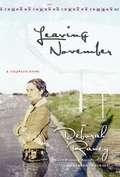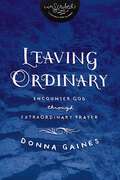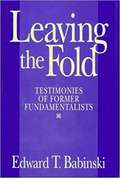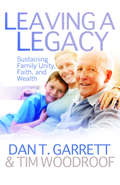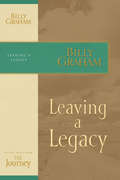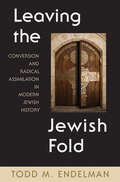- Table View
- List View
Leaving A Godly Legacy (Life Principles Study Series)
by Charles F. StanleyHow to Raise Godly Children.You can be a godly parent and pass a good spiritual and emotional legacy to your children, regardless of what may have happened to you as a child. In Protecting Your Family, Dr. Charles Stanley points out the practical parenting advise to be found in the Bible and shows how such advice still applies to this generation and the next. With over 1 million copies sold, the Charles F. Stanley Bible Study Series is a unique approach to Bible study, incorporating biblical truth, personal insights, emotional responses, and a call to action. Each study draws on Dr. Stanley's many years of teaching the guiding principles found in God&’s Word, showing how we can apply them in practical ways to every situation we face.Each of the ten lessons includes:A brief look at what is covered in the lesson.A teaching from Dr. Stanley that unpacks the topic of the lesson.Application and Bible study questions based on the key points.Key takeaways to put into practice today and tomorrow.
Leaving Alexandria: A Memoir of Faith and Doubt (Canons Ser.)
by Richard HollowayThe prize-winning memoir: &“an enlightening walk through a life that encompasses West Africa…rent strikes, the divided self and the question of grace&” (Scotland on Sunday, UK). An international bestseller and winner of the PEN/Ackerley Prize, Ricard Holloway&’s candid memoir &“is many things. It is a compelling account of a journey through life, told with great frankness; it is a subtle reflection on what it means to live in an imperfect and puzzling world; and it is a highly readable insight into one of the most humane and engaged minds of our times. It is, quite simply, a wonderful book&” (Alexander McCall Smith).At the tender age of fourteen, Richard Holloway left his hometown of Alexandria, north of Glasgow, and travelled hundreds of miles to be educated and trained for the priesthood at an English monastery. By the age of twenty-five he had been ordained and was working in the slums of Glasgow. Through the forty years that followed, Richard touched the lives of many people as he rose to one of the highest positions in the Anglican Church. But behind his confident public faith lay a restless heart and an inquisitive mind.&“Richard Holloway&’s memoir is endlessly vivid and fascinating. It&’s the record of a mind too large, too curious and far too generous to be confined within any single religious denomination…a delight and inspiration to believers, non-believers, and ex-believers alike.&”—Philip Pullman
Leaving Carolina: A Novel
by Tamara LeighPiper Wick left her hometown of Pickwick, North Carolina, twelve years ago, shook the dust off her feet, ditched her drawl and her family name, and made a new life for herself as a high-powered public relations consultant in LA. She’s even “engaged to be engaged” to the picture-perfect U. S. Congressman Grant Spangler. Now all of Piper’s hard-won happiness is threatened by a reclusive uncle’s bout of conscience. In the wake of a health scare, Uncle Obadiah Pickwick has decided to change his will, leaving money to make amends for four generations’ worth of family misdeeds. But that will reveal all the Pickwicks’ secrets, including Piper’s. Though Piper arrives in Pickwick primed for battle, she is unprepared for Uncle Obe’s rugged, blue-eyed gardener. So just who is Axel Smith? Why does he think making amends is more than just making restitution? And why, oh why, can’t she stay on task? With the Lord’s help, Piper is about to discover that although good PR might smooth things over, only the truth will set her free. From the Trade Paperback edition.
Leaving Christian Fundamentalism and the Reconstruction of Identity (Routledge New Critical Thinking in Religion, Theology and Biblical Studies)
by Josie McSkimmingThere is an increasing interest in the influence of religious fundamentalism upon people’s motivation, identity and decision-making. Leaving Christian Fundamentalism and the Re-construction of Identity details the stories of those who have left Christian fundamentalist churches and how they change after they have left. It considers how the previous fundamentalist identity is shaped by aspects of church teaching and discipline that are less authoritarian and coercive, and more subtle and widely spread throughout the church body. That is, individuals are understood as not only subject to a form of judgment, but also exercise it, with everyone seemingly complicit in maintaining the stability of the church organisation. This book provocatively illustrates that the reasons for leaving an evangelical Christian church may be less about what happens outside the church in terms of the lures and attractions of the secular world, and more about the experience within the community itself.
Leaving Christianity: Changing Allegiances in Canada since 1945 (Advancing Studies in Religion)
by Stuart Macdonald Brian P. ClarkeCanadians were once church-goers. During the post-war boom of the 1950s, Canadian churches were vibrant institutions, with attendance rates even higher than in the United States, but the following decade witnessed emptying pews. What happened? In Leaving Christianity Brian Clarke and Stuart Macdonald quantitatively map the nature and extent of Canadians’ disengagement with organized religion and assess the implications for Canadian society and its religious institutions. Drawing on a wide array of national and denominational statistics, they illustrate how the exodus that began with disaffected baby boomers and their parents has become so widespread that religiously unaffiliated Canadians are now the new majority. While the old mainstream Protestant churches have been the hardest hit, the Roman Catholic Church has also experienced a significant decline in numbers, especially in Quebec. Canada’s civil society has historically depended on church members for support, and a massive drift away from churches has profound implications for its future. Leaving Christianity documents the true extent of the decline, the timing of it, and the reasons for this major cultural shift.
Leaving Church: A Memoir of Faith
by Barbara Brown TaylorBy now I expected to be a seasoned parish minister, wearing black clergy shirts grown gray from frequent washing. I expected to love the children who hung on my legs after Sunday morning services until they grew up and had children of their own. I even expected to be buried wearing the same red vestments in which I was ordained. Today those vestments are hanging in the sacristy of an Anglican church in Kenya, my church pension is frozen, and I am as likely to spend Sunday mornings with friendly Quakers, Presbyterians, or Congregationalists as I am with the Episcopalians who remain my closest kin. Some-times I even keep the Sabbath with a cup of steaming Assam tea on my front porch, watching towhees vie for the highest perch in the poplar tree while God watches me. These days I earn my living teaching school, not leading worship, and while I still dream of opening a small restaurant in Clarkesville or volunteering at an eye clinic in Nepal, there is no guarantee that I will not run off with the circus before I am through. This is not the life I planned, or the life I recommend to others. But it is the life that has turned out to be mine, and the central revelation in it for me -- that the call to serve God is first and last the call to be fully human -- seems important enough to witness to on paper. This book is my attempt to do that. After nine years serving on the staff of a big urban church in Atlanta, Barbara Brown Taylor arrives in rural Clarkesville, Georgia (population 1,500), following her dream to become the pastor of her own small congregation. The adjustment from city life to country dweller is something of a shock -- Taylor is one of the only professional women in the community -- but small-town life offers many of its own unique joys. Taylor has five successful years that see significant growth in the church she serves, but ultimately she finds herself experiencing "compassion fatigue" and wonders what exactly God has called her to do. She realizes that in order to keep her faith she may have to leave. Taylor describes a rich spiritual journey in which God has given her more questions than answers. As she becomes part of the flock instead of the shepherd, she describes her poignant and sincere struggle to regain her footing in the world without her defining collar. Taylor's realization that this may in fact be God's surprising path for her leads her to a refreshing search to find Him in new places. Leaving Church will remind even the most skeptical among us that life is about both disappointment and hope -- and ultimately, renewal.
Leaving Eastern Parkway: A Novel
by Matthew DaubA family tragedy forces a Jewish teenage handball prodigy in Brooklyn to examine his identity in this engaging, debut coming-of-age novel.1991. A fifteen-year-old Hasidic boy living in Crown Heights, Zev Altshul can hardly imagine life without handball. He has a gift for it, and that&’s why he&’s risking everything to play in a tournament on the Sabbath. But just as he worries about getting caught, his parents are killed in a hit-and-run and everything changes. Now he his biggest worry is about where he will live . . .At first, Zev is placed into the care of a family within his close-knit, closed community. But when that arrangement becomes problematic, Zev heads to Urbana, Illinois, to stay with his sister, Frida. The trouble is that she left the Jewish faith behind years ago, and going to her means Zev must turn his back on the only sort of life he knows.The culture shock is intense. At first, it&’s just changes to his hair and wardrobe. But then there are things like Star Wars, Shakespeare, Twin Peaks, and pepperoni pizza. It&’s a world full of choices he&’s never had to consider. And now, like it or not, he must decide the type of man he wants to be . . .Praise for Leaving Eastern Parkway&“What a wonderful, evocative, gripping book—it reminds me of the thrill I had when I read Potok novels many years ago!&” —Jeremy Dauber, professor at Columbia University and author of Jewish Comedy:A Serious History&“An authentic look at the joys and failings of insular religious culture as well as a trenchant depiction of the mind of a teenage boy dealing with trauma and dramatic change. When you enter the world created by Daub, you are transfixed. When you leave, you are wiser for the experience.&” —Stuart Rojstaczer, author of The Mathematician&’s Shiva&“Zev&’s story is filled with memorable characters and hard-won wisdom, and the Yiddish and Hebrew that appear throughout lend authenticity. . . It adds up to a surprisingly universal coming-of-age novel about being true to oneself in a world that demands otherwise.&” —Publishers Weekly
Leaving Fishers
by Margaret Peterson HaddixDorry is unbearably lonely at her new high school until she meets Angela and her circle of friends. She soon discovers they all belong to a religious group, the Fishers of Men. At first, as Dorry becomes involved with the Fishers, she is eager to fit in and flattered by her new friends’ attention. But the Fishers make harsh demands of their members, and Dorry must make greater and greater sacrifices. In demonstrating her devotion, Dorry finds herself compromising her grades, her job, and even her family's love. How much is too much? And where will the cult’s demands end?
Leaving Iran: Between Migration and Exile
by Goldin FaridehIn 1976, at the age of twenty-three, Farideh Goldin left Iran in search of her imagined America. She sought an escape from the suffocation she felt under the cultural rules of her country and the future her family had envisioned for her. While she settled uneasily into American life, the political unrest in Iran intensified and in February of 1979, Farideh’s family was forced to flee Iran on the last El-Al flights to Tel Aviv. They arrived in Israel as refugees, having left everything behind including the only home Farideh’s father had ever known. Baba, as Farideh called her father, was a well-respected son of the chief rabbi and dayan of the Jews of Shiraz. During his last visit to the United States in 2006, he handed Farideh his memoir that chronicled the years of his life after exile: the confiscation of his passport while he attempted to return to Iran for his belongings, the resulting years of loneliness as he struggled against a hostile bureaucracy to return to his wife and family in Israel, and the eventual loss of the poultry farm that had supported his family. Farideh translated her father’s memoir along with other documents she found in a briefcase after his death. Leaving Iran knits together her father’s story of dislocation and loss with her own experience as an Iranian Jew in a newly adopted home. As an intimate portrait of displacement and the construction of identity, as a story of family loyalty and cultural memory, Leaving Iran is an important addition to a growing body of Iranian–American narratives.
Leaving Islam, Ex-Muslims and Zemiology
by Weronika LenartowiczCases of ex-Muslims in Europe being punished by their former fellow Muslims constitute an unacceptable practice from the standpoint of democratic societies in which human rights are respected and individuals have the freedom to choose their religion, or none at all. Ex-Muslims’ fear of punishment by their former community should prompt an open, candid, and measured discussion of the issue.Leaving Islam, Ex-Muslims and Zemiology presents the reasons for and consequences of consciously leaving Islam, based on interviews with 80 ex-Muslims currently living in Germany and Sweden. In their view, many of the practices and beliefs of Islam are harmful and unfair. Many parts of the Islamic world regard apostasy as treason or a crime. As a result, emphasis in the book is shifted from “crime” to “harm” and a thesis is put forward concerning the “decriminalization” of apostasy from the perspective of zemiology. The book highlights how a broader shift of interest in the democratic structures of Europe could allow ex-Muslims to join the discussion on the guaranteed right to religious liberties and freedom of speech in the context of the apostasy law in Islam. This should happen without fear for their own security and without facing potential suppression or social exclusion. It will appeal to scholars with interest in Islam and the conflict between religious values and an individual’s aspirations and needs.
Leaving Islam: Apostates Speak Out
by Ibn WarraqIn the West abandoning one's religion (apostasy) can be a difficult, emotional decision, which sometimes has social repercussions. However, in culturally diverse societies where there is a mixture of ethnic groups and various philosophies of life, most people look upon such shifts in intellectual allegiance as a matter of personal choice and individual right. By contrast, in Islam apostasy is still viewed as an almost unthinkable act, and in orthodox circles it is considered a crime punishable by death. Renowned scholar of Islamic Studies Bernard Lewis described the seriousness of leaving the Islamic faith in the following dire terms: "Apostasy was a crime as well as a sin, and the apostate was damned both in this world and the next. His crime was treason ù desertion and betrayal of the community to which he belonged, and to which he owed loyalty; his life and property were forfeit. He was a dead limb to be excised." <p><p> Defying the death penalty applicable to all apostates in Islam, the ex-Muslims who are here represented feel it is their duty to speak up against their former faith, to tell the truth about the fastest growing religion in the world. These former Muslims, from all parts of the Islamic world, recount how they slowly came to realize that the religion into which they were born was in many respects unbelievable and sometimes even dangerous. <p> These memoirs of personal journeys to enlightenment and intellectual freedom make for moving reading and are a courageous signal to other ex-Muslims to come out of the closet.
Leaving Isn't the Hardest Thing: The New York Times bestseller
by Lauren Hough'Hough's conversational prose reads like the voice of a blues singer, taking breaks between songs to narrate her heartbreak in verse, cajoling her audience to laugh to keep from crying' - The New York Times'Hough's writing will break your heart' - Roxane Gay, author of Difficult Women'Each one told with the wit of David Sedaris, and the insight of Joan Didion' - Telegraph 'This moving account of resilience and hard-earned agency brims with a fresh originality' - Publishers WeeklySearing and extremely personal essays from the heart of working-class America, shot through with the darkest elements the country can manifest - cults, homelessness, and hunger - while discovering light and humor in unexpected corners.As an adult, Lauren Hough has had many identities: an airman in the U.S. Air Force, a cable guy, a bouncer at a gay club. As a child, however, she had none. Growing up as a member of the infamous cult The Children of God, Hough had her own self robbed from her. The cult took her all over the globe but it wasn't until she finally left for good that Lauren understood she could have a life beyond "The Family."Along the way, she's loaded up her car and started over, trading one life for the next. Here, as she sweeps through the underbelly of America--relying on friends, family, and strangers alike--she begins to excavate a new identity even as her past continues to trail her and color her world, relationships, and perceptions of self.At once razor-sharp, profoundly brave, and often very, very funny, the essays in Leaving Isn't the Hardest Thing interrogate our notions of ecstasy, queerness, and what it means to live freely. Each piece is a reckoning: of survival, identity, and how to reclaim one's past when carving out a future.
Leaving Isn't the Hardest Thing: The New York Times bestseller
by Lauren HoughSearing and extremely personal essays from the heart of working-class America, shot through with the darkest elements the country can manifest - cults, homelessness, and hunger - while discovering light and humor in unexpected corners.'Hough's writing will break your heart' - Roxane Gay, author of Difficult Women'An edgy and unapologetic memoir in essays' - Kirkus Reviews'This moving account of resilience and hard-earned agency brims with a fresh originality' - Publishers WeeklySearing and extremely personal essays from the heart of working-class America, shot through with the darkest elements the country can manifest - cults, homelessness, and hunger - while discovering light and humor in unexpected corners.As an adult, Lauren Hough has had many identities: an airman in the U.S. Air Force, a cable guy, a bouncer at a gay club. As a child, however, she had none. Growing up as a member of the infamous cult The Children of God, Hough had her own self robbed from her. The cult took her all over the globe--to Germany, Japan, Texas, Chile--but it wasn't until she finally left for good that Lauren understood she could have a life beyond "The Family."Along the way, she's loaded up her car and started over, trading one life for the next. She's taken pilgrimages to the sights of her youth, been kept in solitary confinement, dated a lot of women, dabbled in drugs, and eventually found herself as what she always wanted to be: a writer. Here, as she sweeps through the underbelly of America--relying on friends, family, and strangers alike--she begins to excavate a new identity even as her past continues to trail her and color her world, relationships, and perceptions of self.At once razor-sharp, profoundly brave, and often very, very funny, the essays in Leaving Isn't the Hardest Thing interrogate our notions of ecstasy, queerness, and what it means to live freely. Each piece is a reckoning: of survival, identity, and how to reclaim one's past when carving out a future.(P) 2021 Hodder & Stoughton Ltd
Leaving Lancaster
by Kate LloydCan a splintered Amish family reconcile? More than anything else, thirty-something Holly Fisher longs for family. Growing up in Seattle without a dad or grandparents, she wonders what it would be like to have a heritage, a place of belonging. Holly is furious when her mother, Esther, reveals a long-kept secret: Holly's grandmother and uncles are still alive and begging Esther to return. And Holly is shocked when she learns that the family she's never known lives on a Lancaster, Pennsylvania, farm--as part of an Amish community her mother once abandoned.Guilt-ridden Esther, terrified to see her mother and siblings, begs Holly to accompany her on a visit to Esther's mother before she dies. But can their journey to a conflicting world heal their emotional wounds and finally bring them home?Set in the heart of contemporary Lancaster County, Leaving Lancaster explores the power of forgiveness, family reconciliation, and love where least expected.
Leaving Lavender Tides: A Lavender Tides Novella (A Lavender Tides Novel)
by Colleen CobleShauna and Zach’s dream honeymoon—turned nightmare.Having narrowly avoided tragedy in their hometown of Lavender Tides, Washington, Shauna and Zach Bannister are finally on a honeymoon cruise through the Hawaiian islands. Lost in the glow of their newfound love, they eagerly anticipate basking in the warmth of the lush tropics.But soon the newlyweds begin receiving mysterious threats. After Zach survives two attempts on his life – staged as freak accidents – Shauna ominously receives flowers from a stranger.The lovers become unwitting detectives in an urgent pursuit to discover the identity of their murderous stalker.Set against the spectacular Hawaiian landscape, Colleen Coble’s lightning-paced novella is a haunting journey into a world as remote and hidden as it is beautiful, as spellbinding as it is wondrous.
Leaving Leningrad
by Ludmila ShternAlthough women writers have held a conspicuous place in the history of modern Russian literature, they have been slow to find their true voices in exile. Ludmila Shtern, a geologist/writer who emigrated to the US from the Soviet Union in 1975, offers a completely fresh, unsentimental look at daily life in the former Soviet Union and the US in the second half of the 20th century. Her memoir, part comic bildungsroman, part picaresque adventure, shows its heroine, Tatyana Dargis, growing up in the USSR, falling in love, falling afoul of the KGB, and finally emigrating to the US where new absurdities (capitalist rather than communist in nature) prevail. An amalgam of bittersweet understatement and mordant wit, Shtern's prose is shaped by her ear for a wide range of human voices and the stories they tell, and by her eye for the grotesqueries and savagely funny pain of modern life.
Leaving Lucy Pear
by Anna Solomon"Anna Solomon writes with a poet's reverence for language and a novelist's ability to keep us turning the page. A gorgeous and engrossing meditation on motherhood, womanhood, and the sacrifices we make for love."--J. Courtney Sullivan, author of Maine and The EngagementsChosen as a must-read book for summer 2016 by TIME Magazine, InStyle, Us Weekly, Good Housekeeping, and The MillionsSet in 1920s New England, the story of two women who are both mothers to the same unforgettable girl--a big, heartrending novel from award-winning writer Anna SolomonOne night in 1917 Beatrice Haven sneaks out of her uncle's house on Cape Ann, Massachusetts, leaves her newborn baby at the foot of a pear tree, and watches as another woman claims the infant as her own. The unwed daughter of wealthy Jewish industrialists and a gifted pianist bound for Radcliffe, Bea plans to leave her shameful secret behind and make a fresh start. Ten years later, Prohibition is in full swing, post-WWI America is in the grips of rampant xenophobia, and Bea's hopes for her future remain unfulfilled. She returns to her uncle's house, seeking a refuge from her unhappiness. But she discovers far more when the rum-running manager of the local quarry inadvertently reunites her with Emma Murphy, the headstrong Irish Catholic woman who has been raising Bea's abandoned child--now a bright, bold, cross-dressing girl named Lucy Pear, with secrets of her own.In mesmerizing prose, award-winning author Anna Solomon weaves together an unforgettable group of characters as their lives collide on the New England coast. Set against one of America's most turbulent decades, Leaving Lucy Pear delves into questions of class, freedom, and the meaning of family, establishing Anna Solomon as one of our most captivating storytellers.From the Hardcover edition.
Leaving Lucy Pear
by Anna Solomon'Stunning language, raw emotion and profound wisdom' Celeste Ng, author of Everything I Never Told You'Solomon's strong prose and fleet pacing consistently provide the essential pleasures of a good story well told' Maggie Shipstead, The New York Times Book ReviewOne night in 1917 Beatrice Haven creeps out of her uncle's house on Cape Ann, Massachusetts, leaves her newborn baby at the foot of a pear tree, and watches as another woman claims the child as her own. A gifted pianist bound for Radcliffe, Bea plans to leave her shameful secret behind and make a fresh start. Ten years later, Prohibition is in full swing, post-WWI America is in the grips of rampant xenophobia, and Bea has returned to her uncle's house, seeking a refuge from her unhappiness. But the rum-running manager of the local quarry inadvertently reunites her with Emma Murphy, the headstrong Irish Catholic woman who has been raising her abandoned child - now a bright, bold, cross-dressing girl named Lucy Pear, with secrets of her own...
Leaving Mormonism: Why Four Scholars Changed Their Minds
by Latayne Scott Corey Miller Lynn Wilder Vince Eccles"'As former Mormons turned evangelical Christians, all of whom are accomplished scholars, the four contributors to this volume provide a unique and authoritative corrective. Each shares his or her story of growing up in the Mormon Church, and how biblical, theological, moral, or scientific issues forced them to eventually leave Mormonism. The writers draw on the expertise of their respective academic fields to show how Mormon teachings and practice fall short biblically and rationally. "'They also address common objections raised by former Mormons who have lost faith altogether and have embraced atheism or agnosticism--especially under the influence of 'new atheists' like Richard Dawkins and Christopher Hitchens.'" Even for non-Mormons or for non-ex-Mormons, this book provides powerful Christian apologetics which people need to hear and understand in this secular culture in which we live especially at the college and university level. Besides giving ex-Mormons a Christian alternative, another reason that the writers wrote this book was to give Christian students the understanding and tools necessary to help them defend their faith in these secular environments. Also, often people have doubts about their faith and this book will help them deal with their doubts effectively. At the end of each entry, the authors provide extensive notes, which not only substantiate their facts and thinking, but provide the reader with additional resources.
Leaving November
by Deborah RaneyEight years ago, Vienne Kenney moved away from Clayburn and all its gossip to pursue a law degree in California. But now she has failed the bar exam again. Is she destined to be stuck forever, a failure -- just like her father -- in this two-horse Kansas town? Nine months ago, Jackson Linder left Clayburn with no explanation to anybody. Now he, too, is back. He isn't sure he's ready to face the rumors and well-meaning questions of the town's busybodies. Yet he's determined, once more, to make his art gallery a success -- in spite of the secret that haunts him every day....
Leaving Ordinary: Encounter God Through Extraordinary Prayer (InScribed Collection)
by Donna Gaines InScribedHow to develop an intimate relationship with God through prayer. The deepest longing of the human heart is to know and be known by God. God longs for an intimate relationship with us as well. But how do we develop that kind of relationship with a holy God? It is one thing to long for such a relationship, but quite another to experience intimacy with Him. In Leaving Ordinary, Donna Gaines shares from her personal experience how prayer can become the channel that links the believer&’s heart to the heart of God.God gave the pattern of the tabernacle to the Israelites. It was a temporary and portable dwelling for His glory. Through it God taught them how to approach and worship Him before He led them to their reward—the promised land. Using the tabernacle and its articles as a guide, Donna teaches readers how to interact with God in that secret place of true intimacy that leads to worship. Your ordinary daily practice of prayer can become an extraordinary encounter with the living Lord. Leaving Ordinary is essential reading for anyone who desires to enter into and experience the reality of God&’s presence.As you read, you will:Explore the tabernacle and discover how it can be a guide for prayer today.Learn how to gain a stronger, more intimate relationship with God.Develop your own personal prayer testimony as you experience His presence.
Leaving The Fold: Testimonies Of Former Fundamentalists
by Edward T. BabinskiProtestant fundamentalism claims many converts each year as the devout serve as "witnesses" to draw people "into the fold." This is where the media hype stops. Little is known of the thousands who leave, frustrated, anguished, confused. For them there are no trumpets of glory, no energized fanfare. No one knows fundamentalism like a fundamentalist, and no one can express what it means to struggle with one's faith to the breaking point, like an ex-fundamentalist. <p><p> After presenting a fascinating history of "Fundamentalism's Grotesque Past," this riveting new collection offers testimonies of former fundamentalists who became so disillusioned with their church that they chose to leave. Presenting more than thirty personal journeys, this book gives a clear picture of what attracts a person to the fundamentalist faith and what can drive believers away from their religion. Leaving the Fold includes the religious odysseys of those who left fundamentalism behind in favor of atheism or agnosticism, as well as the spiritual journeys of those who remained Christians but backed away from the powerful attraction of fundamentalism. These testimonies convey not only deep feelings and penetrating facts, but the appeal of dogmatic fundamentalism and each individual's struggle to maintain their faith. <p> Leaving the Fold discusses the fears and dilemmas faced by each person who chose to part ways with the church, their gradual dawning of courage to continue asking questions, and their success in giving their intellectual curiosity the freedom it craves. Christians, atheists, and those who may be questioning their own religious convictions will find Leaving the Fold engrossing. This volume also contains a collection of quotations and an annotated bibliography for those interested in tracking down further testimonies.
Leaving a Legacy: Sustaining Family Unity, Faith, and Wealth
by Dan T. Garrett Tim WoodroofA sobering statistic: For centuries 70 percent of family wealth has dissipated by the second generation, and 90 percent is lost by the third generation. It has nothing to do with taxes, economies, or cultures. It is the failure of families to transfer leadership and values to succeeding generations.The most important inheritance your children receive from you comes while you are still alive. It is embedded in your everyday life. It is made up of the values you prize and the priorities you practice. This is an inheritance you live and model to your family, friends, and the people who make up your world.If your priorities during life are your faith, your relationships, and your values, you should maintain those priorities as you develop your legacy. That means making sure the financial inheritance you leave will be regarded as a tool and a resource to support the real inheritance of values your children have already received.This book will help you put family and faith before fortune as you plan for the future. Doing that increases the chances that your family can thrive in its relationships and still prosper materially for generations. Families who follow the process described in this book will come to a better understanding of their relationship to each other, their community, and to money. Families will learn to communicate more clearly and more honestly about the joys of hard work, shared goals, philanthropy, and finances. They will learn how to communicate, listen to the opinions of others, set family goals, develop family unity, reward individual achievement, and how to make money a tool for achieving family goals for themselves and the kingdom of God.
Leaving a Legacy: The Journey Study Series
by Billy Graham"You will only make this journey once. What kind of journey will it be?" The Christian Life is a marathon, not a sprint. Finishing strong requires a commitment to a journey that continues throughout our lives. How we handle the stresses of the journey is important, but evenmore vital is how we finish the journey-and the spirtiual impact our journey has on these around us. How can Christians become spirirtually stronger with each passing decade? The significant events in life's journey offer the chance to make an impact in the lives of those you love and throughout the wolrd. Leaving a Legacy explains how to let God lead you and others on the journey home. The Journey Study Series is based on Billy Graham's best-selling book The Journey, the culmination of a lifetime of spiritual insight and ministry experience. Each chapter explores the joys, triumphs, and conflicts we all encounter on our journey through life.Use for self-study or shared experience in small groupssix weeks of lessonssidebars offer a scriptural journey through God's wordquestions for starting group discussionsInsight-filled scripture passages to studyEach chapter includes thought-provoking questions, commentary, scriptures, and insights to help you on life's journey. Each lesson teaches the secret of walking with God on life's path. Understanding God's truths will make life's journey easier and let Him fulfill His promise to lead you home.
Leaving the Jewish Fold
by Todd EndelmanBetween the French Revolution and World War II, hundreds of thousands of Jews left the Jewish fold--by becoming Christians or, in liberal states, by intermarrying. Telling the stories of both famous and obscure individuals, Leaving the Jewish Fold explores the nature of this drift and defection from Judaism in Europe and America from the eighteenth century to today. Arguing that religious conviction was rarely a motive for Jews who became Christians, Todd Endelman shows that those who severed their Jewish ties were driven above all by pragmatic concerns--especially the desire to escape the stigma of Jewishness and its social, occupational, and emotional burdens. Through a detailed and colorful narrative, Endelman considers the social settings, national contexts, and historical circumstances that encouraged Jews to abandon Judaism, and factors that worked to the opposite effect. Demonstrating that anti-Jewish prejudice weighed more heavily on the Jews of Germany and Austria than those living in France and other liberal states as early as the first half of the nineteenth century, he reexamines how Germany's political and social development deviated from other European states. Endelman also reveals that liberal societies such as Great Britain and the United States, which tolerated Jewish integration, promoted radical assimilation and the dissolution of Jewish ties as often as hostile, illiberal societies such as Germany and Poland. Bringing together extensive research across several languages, Leaving the Jewish Fold will be the essential work on conversion and assimilation in modern Jewish history for years to come.
